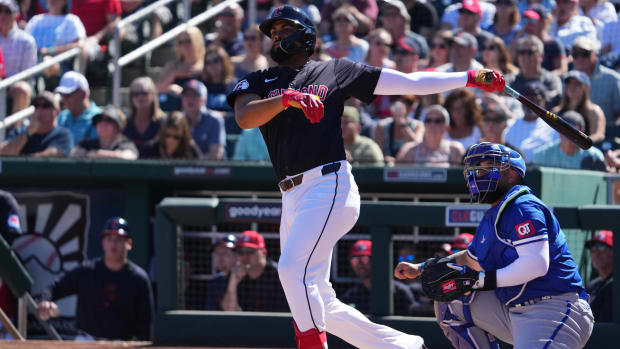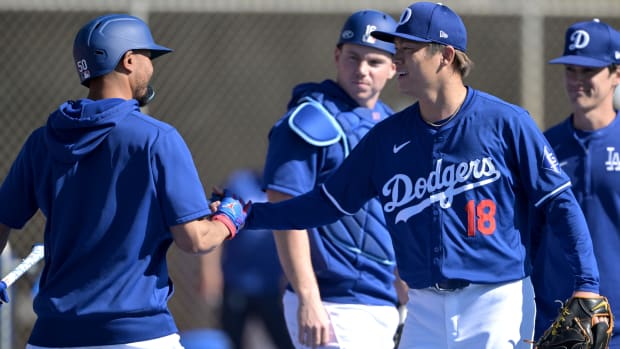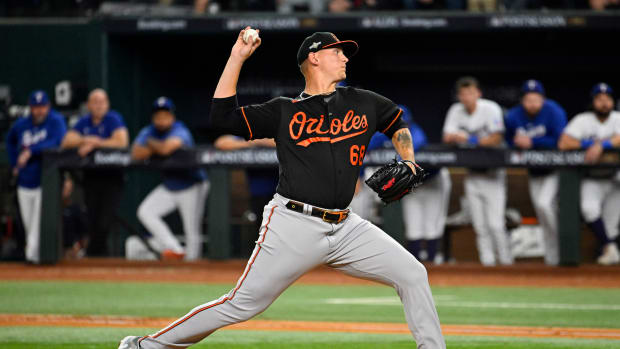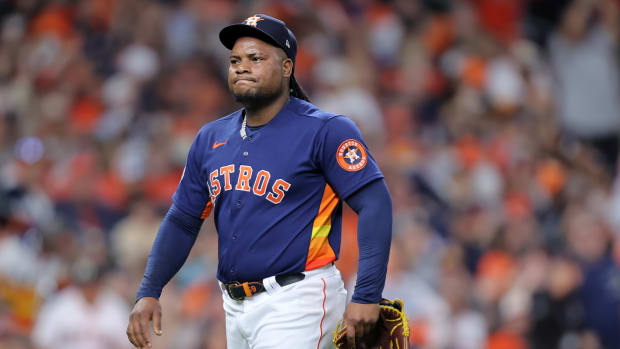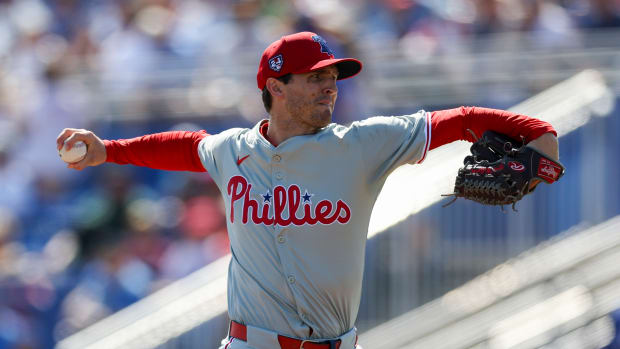World Series Game 4 preview: Mets look to draw even with Royals
Having climbed back into this World Series via a 9–3 win in Game 3 Friday night, the Mets find themselves a position that should be very familiar, at least to their fans. Each of the last two times the Mets were in the World Series, they lost the first two games, then won Game 3. Those two Series had radically different results. In 2000, Game 3 was the only game the Mets won as they fell to the Yankees in five, failing to even force the Series back to the Bronx. In 1986, Game 3 was the start of a wild comeback as the Mets won Game 4, dodged elimination in extra innings in Game 6, and won the Series in seven.
The Royals have seen this situation from both sides as well. In their first World Series in 1980, they fell behind 0–2, then won Games 3 and 4 only to lose the next two and the Series in six. When they returned to the Fall Classic in 1985, they again lost the first two games and won Game 3. That time they lost Game 4 but still managed to battle back to win the final three games and the Series in seven.
• JAFFE: Remembering World Series comebacks by Royals and Mets
Thus, from the limited World Series histories of these two teams alone, we have an illustration of how anything can happen from this point.
Royals at Mets
Series: World Series Game 4, Royals lead Series 2–1
Start Time: 8:07 p.m. ET
TV: FOX
Starting Pitchers: Chris Young (1–0, 2.31 ERA) vs. Steven Matz (0–1, 3.72 ERA)
'It's a Series now': Energized Mets have momentum as barbs fly
Royals swing-man Chris Young is making this start on three day’s rest after throwing 53 pitches and getting the win in extra-innings in Game 1. This is not unfamiliar territory for him. Back in May, he made a start on three day’s rest after throwing 31 pitches over 2 1/3 innings in relief and held the Tigers to one unearned run over six innings in Detroit. On July 11, he started on three day’s rest after a full six-inning start (83 pitches) and turned in a quality start against the powerful Blue Jays (6 IP, 3 R) in Kansas City. He also made a start on two day’s rest after a 12-pitch relief outing earlier in May, also against the Tigers, and threw five hitless innings before reaching his pitch limit. Those are the only starts on less than full rest of Young’s career, but he allowed just four runs (three earned) in 17 innings in them.
Young faced 10 Mets in Game 1 and the only one who reached base was Wilmer Flores via a two-out walk. The only one to hit a fair ball to the outfield was David Wright. Half of the other eight struck out and the other four combined for two groundouts and two infield pop-outs. Young has been outstanding all postseason, striking out 15 in 11 2/3 innings (way up from his regular-season rate of 6.1 strikeouts per nine innings) while allowing just six hits in one start and two long relief appearances.
While no one on the Royals roster has ever faced Steven Matz before, the Mets have already seen Young in this series, and their roster has combined for 70 career plate appearances against him. However, there’s precious little success among those numbers. Michael Cuddyer went 2-for-5 against Young back in 2005. The rest of the Mets have hit .111/.246/.148 combined against him in 65 career plate appearances.
Noah Syndergaard, Mets show Royals they won’t back down in Game 3 win
One encouraging note for the Mets with regard to Young is that he’s unlikely to last long in this game. His lone start this postseason came against the Blue Jays in Toronto and saw him allow two runs in 4 2/3 innings. He averaged 5.5 innings per start during the regular season and hasn’t thrown as many as 80 pitches in a single appearance in four weeks. In the National League park, where he’s as likely to depart for a pinch-hitter as he is because of fatigue or ineffectiveness on the mound, Young seems unlikely to pitch past the fifth inning. The same can be said about Matz, who has completed the sixth inning just once in six starts since returning from a torn latissimus dorsi muscle in early September. Matz hasn’t thrown a pitch in the sixth inning in more than five weeks.
If this does turn into a bullpen game, there won’t be anyone unavailable for either team. Though the Royals used six relievers in Game 3 (everyone but closer Wade Davis), only lefty Franklin Morales threw more than 16 pitches, and while Ned Yost may want to avoid him because of his poor results in Game 3 (he retired just one of the five batters he faced), it’s still not all that unlikely that he might turn to him in a matchup situation. The Mets used their top three relievers with a six-run lead, but none threw more than 13 pitches, and Tyler Clippard may actually have benefited from working a clean inning, something he’s only done in one of his other six appearances this postseason.
One interesting outcome of last night’s parade of Royals relievers was that the Mets again proved capable of doing damage against Kelvin Herrera. In Game 1, three of the eight batters Herrera faced singled, and thanks to a stolen base by Juan Lagares and an error by Eric Hosmer, the Mets pushed a run across against him, just the second Herrera has allowed this postseason. In Game 3, Herrera replaced Morales with the bases loaded and one out and gave up a two-RBI single to David Wright, walked Daniel Murphy, then let a third run score on a sac fly before striking out Lucas Duda to end the inning. With that, five of the 12 Mets Herrera has faced in this Series have reached base, and the Mets have scored four runs on his watch. In the postseason as a whole, Herrera has allowed six of seven inherited baserunners to score. Given Ryan Madson’s struggles earlier in the postseason (8.44 ERA with four home runs allowed in first two rounds), Wade Davis is now the only end-game reliever in the Royals bullpen who still seems invincible.
Despite little recognition, Granderson continues to produce for the Mets
The most important thing that happened for the Mets in Game 3 was that their offense woke up. Specifically, number-two hitter David Wright proved himself capable of catching up to fastballs, hitting a two-run home run on a 94 mile per hour two-seamer from Yordano Ventura in the first inning and adding that two-RBI single off Herrera on a 97 mph heater in the sixth. Travis d’Arnaud, who went 2-for-4 with a double, was the other Mets hitter who appeared to break out in Game 3. Meanwhile, Juan Uribe got into a game for the first time since Sept. 25 and delivered an opposite-field RBI single of his own.
Fun facts about the last two Mets’ World Series appearances in which their first win came in Game 3. In 1986, the run differentials of the first three games were identical: the Mets lost Game 1 by one run, Game 2 by six runs, then won Game 3 by six runs. Again, they came back to win that Series. However, in 2000, the Series turned back away from after their Game 3 win when the opposing leadoff hitter, a shortstop wearing the number 2, jumped on the first-pitch in Game 4 and hit a home run.
• SPAN: Royals’ Mondesi becomes first player to make debut in World Series
Speaking of the latter, much was made overnight about the fact that Noah Syndergaardreadily admitted that his first pitch of Game 3, which was inside and head-high to Alcides Escobar, was designed to make the Royals’ leadoff man, who is famous for swinging at the first pitch, uncomfortable. The Royals, particularly Mike Moustakas, were visibly upset immediately after the pitch as well as after the game and, given Kansas City’s penchant for dustups with opposing teams during the regular season, there’s some concern that they may attempt to retaliate. Let’s hope not. Syndergaard’s pitch may have been a bit higher than necessary, but it wasn’t that far inside and one look at this heat map of Escobar’s success on first pitches during the first two rounds of the playoffs makes it clear that it was a smart way to start that at-bat.






























